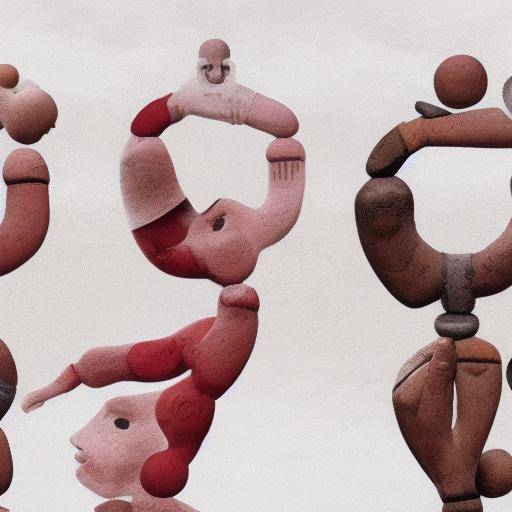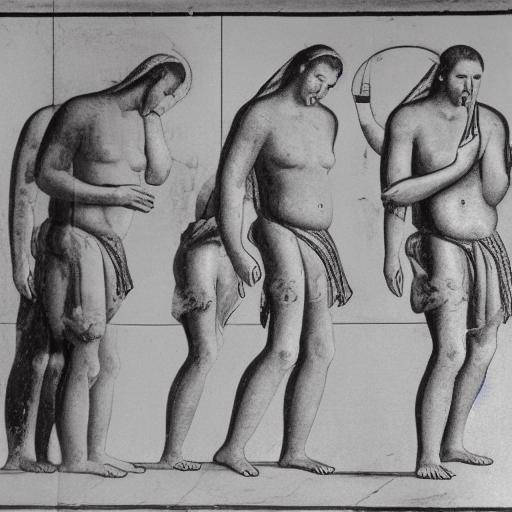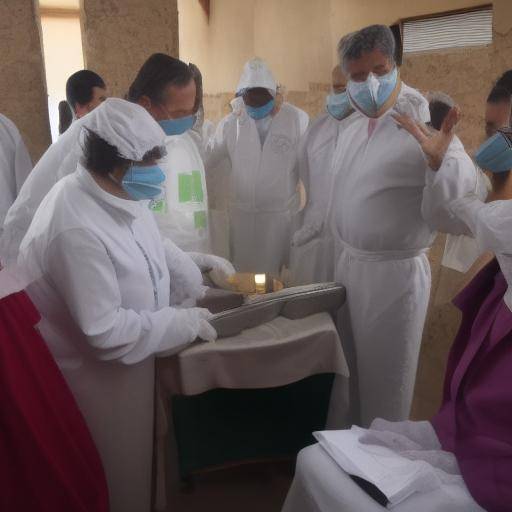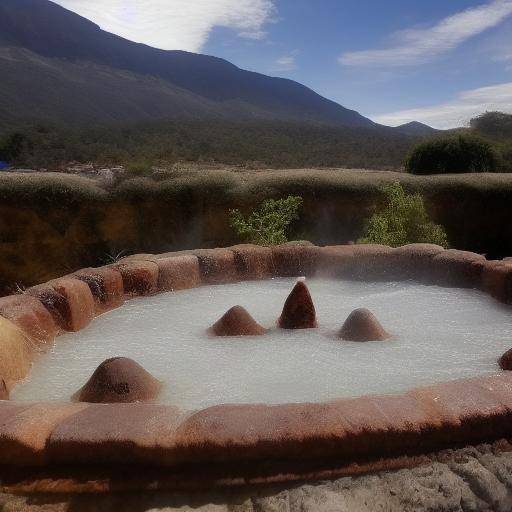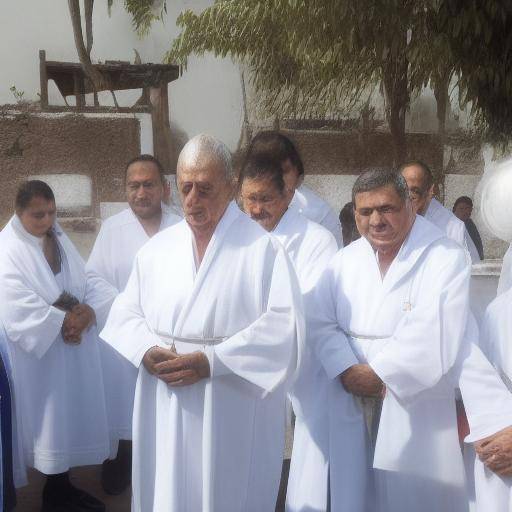
Introduction
The purification rituals have been an integral part of diverse cultures throughout history, each with its own traditions and practices. These rituals not only play a significant role in spirituality and culture, but also have an intriguing relationship with health. In this article, we will explore in detail the purification rituals and their impact on health, as well as their importance in contemporary societies. From the history and foundations of purification rituals to their role in promoting physical, mental and emotional health, this article will provide an enveloping and valuable vision to understand the impact of these rituals on everyday life.
History and Background
The rituals of purification have deep roots in the history of humanity. From ancient civilizations to contemporary religious and spiritual practices, purification has been considered fundamental to human well-being. In order to eliminate the impurities of the body, mind and spirit, human beings have resorted to a wide range of rituals over time. Purification traditions vary significantly according to culture and belief, but they share a fundamental purpose: to restore balance and harmony.
Purification has been an integral part of religious and spiritual practices in many cultures, from the sacred bath in Hinduism to baptism in Christianity. These rituals not only represent an act of faith, but also have direct implications for the health and well-being of individuals who practice them. In many indigenous cultures, purification is done through ceremonies that include the use of medicinal herbs and exposure to water, smoke or land as means of cleaning the body and spirit.
Benefits and Challenges
Purification rituals offer a number of potential health benefits. First, these rituals are believed to help eliminate physical and emotional toxins from the body, which can contribute to better physical and mental health. In addition, many purification rituals involve practices that encourage relaxation and introspection, which can have significant benefits for emotional and spiritual health.
However, it is also crucial to consider the possible challenges associated with the purification rituals. In some cases, purification practices may be extreme or detrimental to health if they are not carried out with caution and knowledge. It is important to address these challenges by analyzing purification rituals in the context of health and well-being.
Detailed Analysis
A deeper analysis of purification rituals reveals that their relationship with health goes beyond physical cleansing. These rituals often involve elements that can have positive effects on human physiology. For example, exposure to heat in saunas or steam baths has been associated with benefits for blood circulation and cardiovascular health. Similarly, meditation and contemplation, which are common components of purification rituals, have proved to have positive effects on mental and emotional health.
At the same time, it is essential to address the critical perspectives of purification rituals. Some critics argue that these practices may be based on pseudo-scientific beliefs and superstitions, and that the supposed health benefits may not be supported by solid scientific evidence. This debate on the effectiveness and validity of purification rituals in the context of health highlights the need for a critical and informed review of these practices.
Exhaustive examination
The thorough analysis of purification rituals reveals that their relationship with health is complex and multifaceted. The application of these rituals in contemporary environments, both in religious and spiritual contexts and in secularized environments, poses unique challenges and opportunities. Understanding the interaction between purification and health rituals involves careful consideration of multiple factors, from cultural beliefs to current scientific evidence.
Comparative analysis
Compare health, purification rituals and relationship reveals significant connections between these seemingly different concepts. Health, in its wider sense, is not limited only to physical well-being, but encompasses emotional, mental and spiritual aspects. The purification rituals, in turn, seek to restore balance in all these dimensions, offering a holistic approach to well-being. Examine the relationship between these concepts allows a deeper understanding of how purification rituals can influence health in their multiple facets.
Practical Tips and Accessible Tips
If you are interested in exploring the purification rituals and their role in health, here are some practical tips:
- Investigate purification practices in different cultures to understand their diversity and wealth.
- Consider participating in purification rituals under the guidance of experienced and respected practitioners.
- Reflect on your own beliefs and values to understand how purification rituals can resonate with you on a personal level.
- It seeks up-to-date scientific evidence on the possible health benefits and risks associated with purification rituals.
Industry Perspectives and Expert Reviews
The purification rituals and their relationship with health continue to generate interest in a variety of fields, from anthropology to holistic medicine. Experts in these areas provide key perspectives on the importance of understanding and respecting purification practices in the broader context of human health and well-being. Their views and recommendations offer valuable guidance for those who seek to better understand these complex issues.
Case Studies and Real Life Applications
Case studies that examine the practical application of purification rituals in various communities and contexts provide a rich and detailed view of how these practices directly impact people's health and well-being. In analyzing the results and lessons learned from these studies, it is possible to obtain a more comprehensive and nuanced understanding of the purification rituals and their relevance to health.
Future Trends and Predictions
In the future, purification rituals are likely to continue to play a significant role in promoting holistic health. As scientific research continues to explore the potential benefits of these practices, innovative approaches that integrate traditional wisdom with current evidence may be developed. Moreover, growing awareness of the importance of integral well-being could generate renewed interest in purification rituals as tools for health and balance.
Conclusion
The rituals of purification, with their profound history and their intrinsic connection to health, offer a fascinating window towards understanding the interaction between spirituality, culture and human well-being. By exploring the richness and complexity of these rituals, it is possible to acquire a deeper appreciation of their relevance to health in its wider sense. By continuing to investigate, reflect and discuss these issues, it is possible to discover new approaches to the promotion of health and balance in our daily lives.
Frequently asked questions
What are some examples of purification rituals in different cultures?
Examples of purification rituals are varied and range from the sacred bath in Hinduism to the Temazcal in American indigenous cultures. Other examples include the ceremony of the sweatshop in Japan and the rite of passage to adulthood in some African cultures.
###How can purification rituals affect mental and emotional health?
Purification rituals often involve practices that foster relaxation, introspection and connection with the spiritual. These experiences can have a positive impact on mental and emotional health by providing a space for reflection, emotional liberation and community connection.
Are the purification practices supported by scientific evidence?
While some aspects of purification rituals, such as heat exposure or meditation, have scientific backing in terms of health benefits, it is important to address each practice individually. Some may be based on cultural or spiritual beliefs with little solid scientific evidence.
What is the relevance of purification rituals in contemporary society?
Although in many contemporary contexts, purification rituals have lost practical relevance, they continue to represent a valuable manifestation of cultural and spiritual traditions. In addition, its impact on health and well-being continues to generate interest in fields such as psychology, anthropology and holistic medicine.
How can purification rituals influence the relationship between the body and the mind?
The purification rituals often promote a holistic understanding of health by recognizing the interconnection between the body and the mind. By focusing on physical and spiritual cleansing, these rituals emphasize the importance of maintaining a comprehensive balance that encompasses physical, mental and emotional health.
What are some important considerations when participating in purification rituals?
It is essential to address the purification rituals with respect, understanding and cultural sensitivity. Before participating, it is advisable to investigate specific practices, seek guidance from experienced practitioners and consider the cultural and historical context in which these rituals are carried out.
What role do purification rituals play in promoting holistic health?
The purification rituals offer a holistic approach that seeks to balance physical, mental and spiritual health. By fostering cleanliness and harmony at multiple levels, these rituals can contribute to the promotion of comprehensive health that recognizes interconnection between all facets of human well-being.
As we explore the purification rituals and their relationship with health, it is clear that these topics are as complex as they are fascinating. From its profound history to its continued influence in contemporary society, the purification rituals invite us to reflect on the connection between spirituality, culture and human well-being. By continuing to examine, question and learn about these issues, it is possible to discover new ways of understanding and promoting health in all its dimensions.


